|
|
|
Sort Order |
|
|
|
Items / Page
|
|
|
|
|
|
|
| Srl | Item |
| 1 |
ID:
091969
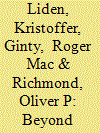

|
|
|
|
|
| Publication |
2009.
|
| Summary/Abstract |
Reflecting the Western-led, international political climate after the Cold War, the various peace operations of the last two decades have sought to build sustainable forms of peace through political, social and economic liberalization. As postulated by liberal constitutionalism and internationalism, these efforts are expected to contribute to international as well as domestic peace by adding the liberalized state to a pacific union of liberal democracies. Their aim is to reproduce the (neo)liberal (meaning a market democracy) sovereign state and a liberal normative and institutional system of government and international governance.
|
|
|
|
|
|
|
|
|
|
|
|
|
|
|
|
| 2 |
ID:
091970
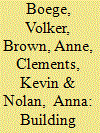

|
|
|
|
|
| Publication |
2009.
|
| Summary/Abstract |
Peacebuilding supports the emergence of stable political community in states and regions struggling with a legacy of violent conflict. This then raises the question of what political community might mean in the state in question. International peacebuilding operations have answered that question in terms of the promotion of conventional state-building along the lines of the Western Organization for Economic Cooperation and Development (OECD) model as the best path out of post-conflict state fragility and towards sustainable development and peace. This article argues for peacebuilding beyond notions of the liberal peace and constructions of the liberal state. Rather than thinking in terms of fragile states, it might be theoretically and practically more fruitful to think in terms of hybrid political orders, drawing on the resilience embedded in the communal life of societies within so-called fragile regions of the global South. This re-conceptualization opens new options for peacebuilding and for state formation as building political community.
|
|
|
|
|
|
|
|
|
|
|
|
|
|
|
|
| 3 |
ID:
091971
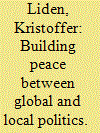

|
|
|
|
|
| Publication |
2009.
|
| Summary/Abstract |
What are the ethical implications of the shortcomings of liberal peacebuilding operations? This article addresses the problem by investigating the normative premises of liberal peacebuilding and its critics. Three ideal types of peacebuilding are singled out to illuminate the normative logic of current 'revisionist' proposals. These are: 're-liberal peacebuilding' which prescribes a more coercive approach; 'social peacebuilding' that emphasizes local agency and the promotion of socioeconomic rights; and 'multicultural peacebuilding' that roots peace in indigenous norms and institutions. These alternatives are assessed with regard to their ability to promote both the autonomy and the basic needs of the affected population. It is concluded that only 'social peacebuilding' passes this test. It exemplifies a model of global governance where a cosmopolitan human rights agenda is consistent with the communitarian defence of political autonomy and cultural diversity.
|
|
|
|
|
|
|
|
|
|
|
|
|
|
|
|
| 4 |
ID:
091977
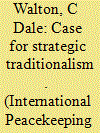

|
|
|
|
|
| Publication |
2009.
|
| Summary/Abstract |
Liberal peacemaking and peacebuilding are an inherently dangerous enterprise, which should be approached with great caution. This was demonstrated by numerous problematic liberal peacebuilding efforts in the 1990s and 2000s, events that underlined the view that there has been no fundamental global change in attitudes toward the use of violence for the attainment of political ends. As a result, Western leaders are likely to be much less inclined to undertake large-scale and/or difficult peacebuilding missions in the future. This is a desirable trend, as peacebuilding efforts undertaken by democracies should be guided fundamentally by national interests rather than humanitarian goals.
|
|
|
|
|
|
|
|
|
|
|
|
|
|
|
|
| 5 |
ID:
091972
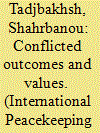

|
|
|
|
|
| Publication |
2009.
|
| Summary/Abstract |
The implementation of liberal peace in the context of both transition economies and post-conflict situations often involves policy advice from international financial institutions for rapid opening of the economic and political systems. Experience, however, shows that the immediate outcome is increased poverty and inequality, leading to high social and human costs. Efficiency-based inquiries on externally supported state building and peacebuilding projects often use a problem solving approach which seeks ways to improve performance without questioning the validity of the liberal peace model. Inquiries based on critical theory, however, question the underlying assumptions and the legitimacy of the project itself. Using evidence from Central Asia and Afghanistan, the article argues that legitimacy depends on both how much, in the eyes of local populations, liberal peace actually improves everyday life, and how much it is valued as a goal and adheres to internal norms and values. The main proposition is that values determine how the liberal peace model is understood, while outcomes impact on how the project is accepted. High expectations of protection and welfare during crises also mean that the state can play a key role as legitimizer.
|
|
|
|
|
|
|
|
|
|
|
|
|
|
|
|
| 6 |
ID:
091974
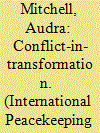

|
|
|
|
|
| Publication |
2009.
|
| Summary/Abstract |
Conflict transformation, and the 'liberalizing peace' paradigm of which it is a part, applies a specific ethos of transformation to the project of peacebuilding. This ethos reshapes conflict and the ways in which it is manifested. An ethico-phenomenological approach is used here to examine the phenomenon of 'conflict-in-transformation' (as opposed to 'peace') that this creates. To this end, the ethical critiques of Charles Taylor, the literature on 'emancipatory' forms of peacebuilding and the European Union's Programmes for Peace and Reconciliation in Northern Ireland are examined. This analysis is applied to phenomena of conflict-in-transformation in post-1998 Northern Ireland. In examining this case, the article highlights how an ethico-phenomenological approach can help to identify the (new) forms of conflict engendered by the liberalizing peace paradigm, with a view to transcending these through the development of new directions in theory and practice.
|
|
|
|
|
|
|
|
|
|
|
|
|
|
|
|
| 7 |
ID:
091975
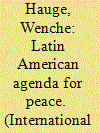

|
|
|
|
|
| Publication |
2009.
|
| Summary/Abstract |
At the beginning of the twenty-first century, Latin American leaders - particularly from South America - collectively raised ethical questions about the foundations and practices of liberal peacebuilding. Embracing the idea of democracy as central to peace, these leaders have delinked democracy from the free market ideology and have developed their own models of regional economic cooperation, conflict management and dialogue. This article identifies the main discrepancies between the Latin American discourses and policies and the liberal interpretation of peacebuilding. It contends that the Latin American model provides alternatives to the hegemonic peacebuilding discourse.
|
|
|
|
|
|
|
|
|
|
|
|
|
|
|
|
| 8 |
ID:
091973
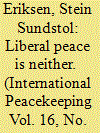

|
|
|
|
|
| Publication |
2009.
|
| Summary/Abstract |
This article discusses the attempts at state-building by international actors in the Democratic Republic of Congo (DRC). It uses this experience to discuss some of the obstacles and dilemmas facing external state-builders. I argue that attempts at state-building by foreign actors in the DRC have not had much success, and point out four reasons. First, insufficient resources have been provided. Second, donors have used a standardized approach that does not take local context sufficiently into account. Third, domestic power relations have been such that state-building has not served the interests of key actors. Finally, the policy has been based on a fixed, non-negotiable conception of what the state eventually should look like. Although all these factors have contributed to the failure to create a liberal state in the DRC, the last two appear to be more fundamental than the first and the second.
|
|
|
|
|
|
|
|
|
|
|
|
|
|
|
|
| 9 |
ID:
091976
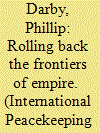

|
|
|
|
|
| Publication |
2009.
|
| Summary/Abstract |
This article presents a postcolonial critique of the liberal peacekeeping project and canvasses ideas for a very different approach. It is argued that peacekeeping in the non-European world is cast in the colonial mould of intervention from above and outside. A case is then made that as the provision of security is now tied to a development agenda, liberal interventionism works to legitimize the existing world order. On the premise that there is a need for an alternative model to the liberal project, the article concludes by proposing that the everyday be privileged as the site for security, in the North as well as in the South.
|
|
|
|
|
|
|
|
|
|
|
|
|
|
|
|
|
|
|
|
|